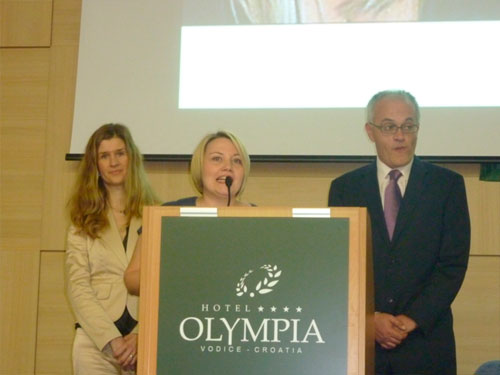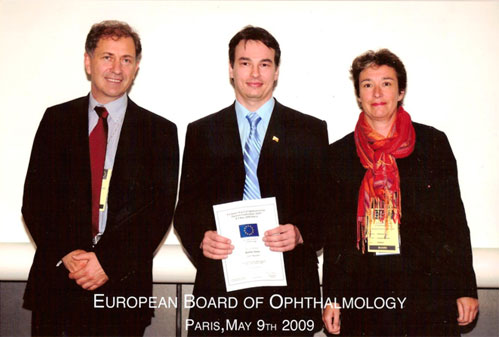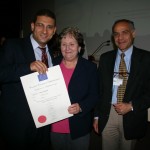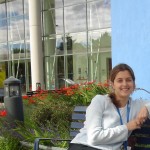EBO Reports
I have passed the exam of the European Board of Ophthalmology [EBO] in May 2007. I had the honor to be the first Czech ophthalmologist who passed this exam.
At this time I was working as a vitreoretinal surgical fellow in King’s college hospital in London.
In my opinion an ophthalmologist with few years experience of work at a good hospital should be able to pass the clinical part of the exam and should be able to recognize the diagnosis of the presented images and to discuss the possible treatment. I think the clinical part is not a problem at all and for general review you may need a simple summarized book, for me Clinical Ophthalmology: A Synopsis by Kanski was enough.
I think the written part of the exam is more difficult than the oral and it is the key for success. It is good to focus on choosing the best answer. It is important to practice the multiple choice system from different websites for preparation for similar exams like the membership of the British royal college of ophthalmology.
If you are busy on your work and has limited time to study only in the weekends and after work so you may need about 6 months preparation, but if you are free you may need much less time.
Good luck
Tarek Aboutable MD PhD FEBO
Vitreoretinal Consultant
tarekcz@yahoo.com
EBO Experience-Maria Milia, Greece-May 2011
Passing the EBO examination was a goal I set when I started my last year of training in Ophthalmology in Greece after completing 3 years of Ophthalmology in the UK. The EBO exam is becoming more and more popular with Greek trainees and I thought it would be a challenge and great opportunity for me. It is not obligatory in Greece at present but highly recommended. It gave me the amazing chance to read through basic sciences applied to the eye and the most important topics in ophthalmology. Unless a trainee has the pressure of an exam coming up there are certain details which one cannot read through carefully and remember. The written part is a bit stressful with regards to the negative marking. The 52 MCQs are reasonable but require a good preparation for this sort of test. Some questions are difficult and there will always be certain questions a candidate will be unsure of. The main tip is not to panic, to read carefully and to allow time to concentrate and think carefully. The second part which comprises of 4 separate stations each one with 2 examiners is the oral part. Each station has a different topic. There is no time to prepare your answers as questions are asked in the form of a clinical scenario based on images/patients tests shown on a screen. The examiners are friendly and one can choose to be examined in their own language. I chose to take the oral exam in English but if a candidate feels safer in their own language, there are options of other languages for the oral part. The examination days ends with a nice dinner accompanied with music and results are announced on the next day followed by the Diploma Award Ceremony. The pass rate is very good so don’t stress and panic. The organisation and administration is excellent and the two days run very smoothly for participants. The Palais de Congres is a lovely venue too.
The EBO website is a great resource for the exam along with the usual literature such as the AAO series, Kanski and books for basic sciences applied to the eye. Paris is lovely at this time of year so after the exam is over its nice to reward yourself with a walk around this gorgeous city. Altogether I highly recommend this exam to my colleagues across Europe regardless of whether it is compulsory for them or not. It is the best way to refresh your knowledge, revise and learn and above all a rewarding experience.
Don’t miss this opportunity!
Ivana Bednar
Ivana, congratulations for successfully taking the EBO exam! You are one of the first Croatian candidates to have taken the exam. What prompted you to apply for the examination?
First of all, I am very proud to be one of the two Croatian candidates who participated at the EBOD exam. This was the first time that candidates from our country were allowed to sit the exam, so it was great honor to represent it.
My main motivation was testing myself and my knowledge. I took specialist diploma examination in Croatia on March 5. 2007. I have worked as a licensed specialist for more than two years, so I was curious if I’ve lost some of the knowledge and I also wanted to compare our education with European standards.
I’ve first heard of the EBOD when I was on SOE Grant in Erasmus Clinic in Rotterdam. I was able then to compare our clinical knowledge but I also wanted to find out how we stand in theoretical part. The books we use for education are basically the same,
clinical practice is followed accordingly to all up to date guidelines, and I am happy to say, from my experience with this exam, we are not at all far behind.
What are your recollections of the exam?
The examination itself was very stressful for me. First of all, I was burdened by the feeling that I am one of the first Croatian candidates and I didn’t want to let my professors down. Next, I didn’t know what to expect because of the new negative marking. Also, our national
examination is completely different. It consists of oral examination in front of a committee of 3 professors. Frankly, the written part of the examinaton was difficult but oral part was a pleasant conversation. All in all, it was great experience! I met many new colleagues with whom I can now share my professional doubts, and also renewed and filled in my knowledge.
What would be your two top tips for future EBOD candidates?
- Study, read, look, remember and learn. And then repeat all of the above all over again. Don’t be insecure, but also never think that you know everything. There is always something new to find out.
- Take this test as very positive and rewarding experience. Everything you learn will be at some time useful in your everyday practice. Also, after you pass the exam you will feel very good about yourself and more secure in your diagnostic and therapeutic decisions.
Which online resources did you consult during exam preparation?
My first stop was the EBO website – www.ebo-online.org. The second was the AAO website – www.aao.org, I looked especially into Preferred Practice Patterns. I also checked PUBMED regularly for new developments.
Would you recommend this exam to your colleagues?
Yes I would. As a matter of fact, at this year’s Croatian Ophthalmology Society meeting our president, professor Vatavuk, recommended this exam to all colleagues, residents and specialists alike, as a way to prepare for the national exam and to renew the knowledge.

Ivana Bednar
Tomas Benda
Annually, in early May, Paris becomes the scene of the European Board of Ophthalmology Diploma Examination for ophthalmologists from all countries of the European Union. They assemble in the modern Palais des Congrès to pass an intensive testing assessing their theoretical knowledge and clinical skills. This is considered as a prerequisite to provide a high standard of the ophthalmologic care both in hospitals or independent clinical practices. The aim of the examination is to harmonize the level of education in European Countries and to objectify the testing procedure. The EBOD Examination is voluntary in most countries of the European Union. However, some countries like Switzerland, Belgium and Austria have substituted their own National Specialist Examination by the EBOD Examination. The successful candidate may add the title Fellow of the European Board of Ophthalmology (FEBO) after his or her name.
The main language of the exam is English. However the German and French speaking colleagues can write the test in their native language. The whole exam consists of 2 parts and is passed within a single day. The first part, called „Written Paper“, consists of 52 multiple choice questions (MCQs). There is a time limit of 3 hours to pass this part. The MCQ cover any basic scientific, medical or surgical topics relevant to the practice of ophthalmology. The „Oral Examination“ is the second part of the exam. Four separate assays of 15 min each are passed out within four panels consisting of two examiners. The viva voice panels are: 1. Optics, Refraction, Strabismus and Neuro-ophthalmology, 2. Cornea, External Diseases, Orbit and Ocular Adnexa, 3. Glaucoma, Cataract and Refractive Surgery, 4. Posterior Segment, Ocular Inflammation and Uveitis. The questions are laid in rapid succession and the answers must be immediate and without preparation.
The exam day is closed by a social evening with dinner and entertainment in the French style. The Diploma Award Ceremony takes place the day after the Written Paper and Oral Examination.
What is the motivation for passing the examination for young ophthalmologists from across the Europe, especially if it is not mandatory for them?
Someone wants to have an accreditation that is recognised across the Europe. Others need a motivating factor to both refresh their knowledge in ophthalmology and bring them up-to-date in all aspects of their profession. For me, this exam was primarily a personal challenge. I have passed the EBOD in 2009 and joined my two colleagues from the Czech Republic, who had successfully completed it in previous years. I wanted to improve my knowledge to the level I met during the course of observerships at European clinics. Actually, the preparation for the exam was the most challenging for me. This period took me 5 months. However it was very satisfying for me, because I gained new knowledge in Ophthalmology. The examination was challenging and stressful. I personally consider the written test as the most difficult part, testing a deep and detailed knowledge. It can not be handled without a careful preparation. The oral examination was some relief for me, because I prefer the personal contact with the examiner. I appreciate the niceness of the examiners that facilitated the demanding pace of oral testing, in which it is necessary to respond quickly to questions and demonstrate practical knowledge. Exactly one hour of the oral examination expired very quickly. I very appreciate the successful social evening, which followed shortly after the afternoon testing. The participants could forget the stress during the exams and relax during the dinner in French style accompanied by music. It was also an extraordinary opportunity to meet the colleagues from across Europe and to share the experiences with them in a relaxed atmosphere.
The result were announced the day after exams, making sad some, but happy almost of 90% of the graduates. The Diploma Award Ceremony was a pleasant ending of the event.
European Board of Ophthalmology Diploma Examination was for me an exceptional and very pleasing experience. I warmly recommend to pass it to all my colleagues, whether residents or practicing specialists. You take away knowledge that meets the high European standards together with memories on the extraordinary event.

Tomas Benda


